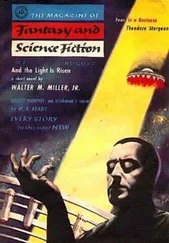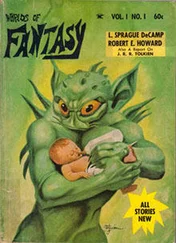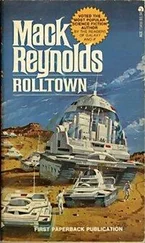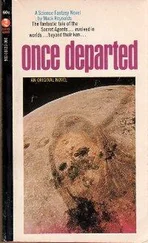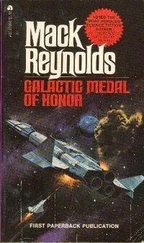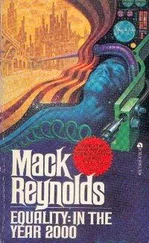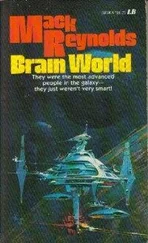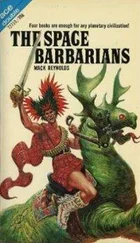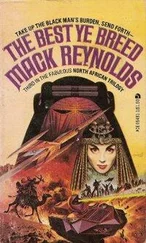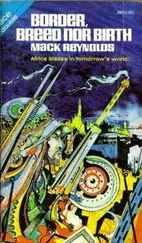Mack Reynolds - The Rival Rigelians
Здесь есть возможность читать онлайн «Mack Reynolds - The Rival Rigelians» весь текст электронной книги совершенно бесплатно (целиком полную версию без сокращений). В некоторых случаях можно слушать аудио, скачать через торрент в формате fb2 и присутствует краткое содержание. Год выпуска: 1967, Издательство: Ace Books, Жанр: Фантастика и фэнтези, на английском языке. Описание произведения, (предисловие) а так же отзывы посетителей доступны на портале библиотеки ЛибКат.
- Название:The Rival Rigelians
- Автор:
- Издательство:Ace Books
- Жанр:
- Год:1967
- ISBN:нет данных
- Рейтинг книги:4 / 5. Голосов: 1
-
Избранное:Добавить в избранное
- Отзывы:
-
Ваша оценка:
- 80
- 1
- 2
- 3
- 4
- 5
The Rival Rigelians: краткое содержание, описание и аннотация
Предлагаем к чтению аннотацию, описание, краткое содержание или предисловие (зависит от того, что написал сам автор книги «The Rival Rigelians»). Если вы не нашли необходимую информацию о книге — напишите в комментариях, мы постараемся отыскать её.
The Rival Rigelians — читать онлайн бесплатно полную книгу (весь текст) целиком
Ниже представлен текст книги, разбитый по страницам. Система сохранения места последней прочитанной страницы, позволяет с удобством читать онлайн бесплатно книгу «The Rival Rigelians», без необходимости каждый раз заново искать на чём Вы остановились. Поставьте закладку, и сможете в любой момент перейти на страницу, на которой закончили чтение.
Интервал:
Закладка:
The Honorable Russ put in gently, “Please, Honorable Watson, your percentage figures are impressive only if we know from what basis you start. If you produced but five million tons of steel last year, then your growth to ten million is very good but it is still not a considerable amount for an entire planet.”
Buchwald said dryly, “If our agents are correct, Texcoco steel production is something like a quarter of our own. I assume that your other basic products are at about the same stage of development.”
Watson flushed. “The thing to remember is that our economy continues to grow each year. Yours spurts and stops, jerks ahead a few steps, then grinds to a halt or even retreats. Everything comes to a pause if you few on the top stop making a profit; all that counts in your economy is making money for you stutes in the saddle. Which reminds me. How in the world did you ever get out of that planet-wide depression you were in three years ago?”
Peter MacDonald grunted his disgust. “Planet-wide depression, indeed. A small recession. A temporary readjustment due to over-extension in certain economic and financial fields. It was more a matter of the economy moving sideways for a time. We have built-in guards against any such thing as a depression in the old sense.”
From the other side of the table, Dick Hawkins laughed at him. “Where’d you pick up that line of gobbledegook, Peter. You sound as though you’ve been prowling the Pedagogue’s library, looking up the old apologists.”
Peter MacDonald came to his feet in indignation. “I don’t have to put up with this sort of impudence,” he snapped. “What do you know about economics? That ridiculous collectivized society you’ve jerrybuilt over on Texcoco is proof enough that you’re incompetent to have intelligent opinions.”
Watson lurched to his own feet. “Nor do we have to listen to your snide cracks about the real progress Texcoco is making, MacDonald. We know what’s being accomplished there and we’re the ones doing it.”
He glared around at his associates. “We don’t seem to be making any progress around here,” he snapped. “Hawkins, Taller, Roberts! Let’s go. Ten years from now, we’ll be back and there’ll be another story to tell. Even a blind man will be able to see the difference by then.”
They marched down the Pedagogue’s corridor toward their space lighter, their military boots clanging loud on the bare metal of the floors.
Kennedy called after them: “Ten years from now every family on Genoa’ll have a car. Wait’ll you see. Television, too. We’re introducing TV next year. An’ civil aviation. Be all over the place in two, three years…”
The Texcocans slammed the spaceport after them.
Kennedy sloshed some more drink into his glass. “Slobs can’t stand the truth,” he explained to the others. “Bunch of cloddies.”
XI
With the exception of a few additional delegates of high ranking Texcocan and Genoese political and scientific heads, the line-up at the end of forty years was the same as ten years earlier—except for the absence of Jerry Kennedy.
Extra tables had been set up and chairs to accommodate the added numbers. To one side were the Genoese: Martin Gunther, Fredric Buchwald, Peter MacDonald with such repeat delegates as Baron Leonar and the Honorables Modrin and Russ and half a dozen newcomers. On the other were Barry Watson, Dick Hawkins and Natt Roberts, Taller and such Texcocans as the scientists Wiss and Foken, army heads, Security Police officials and other notables. All of the Texcocan delegation were in uniform, even the scientists.
Notepads had been placed before each of them and both Barry Watson and Martin Gunther were equipped with gavels.
While chairs were still being shuffled, Barry Watson said over the table to Gunther, “Jerry?”
Martin Gunther shrugged. “Jerry Kennedy is, ah, indisposed.” He hesitated, then added, “As a matter of fact, he’s at one of the mountain sanitariums, taking a cure. He’ll be all right.”
Dick Hawkins said grudgingly, “Good. We’ve lost too many.”
Watson pounded with his gavel. “Let’s come to order. Gunther, do you have anything to say in the way of preliminaries?”
The other shook his head. “Not especially. I believe we all know where we stand, including the newcomers from Genoa and Texcoco. In brief, this is the fourth meeting of the Earth teams that were sent to these two planets to bring backward colonists to an industrialized culture. It would seem that we are both succeeding—possibly at different rates. Forty years have passed. Ten remain to us.”
For a moment there was silence as those present thought back over the years.
Finally, Natt Roberts said, “Possibly you have already discovered this, through your agents, but we have released the information on prolonging of life.”
Peter MacDonald, heavier than ever, wheezed, “We too were pressured into such a step.”
Baron Leonar said, “And why not?”
Taller, across the table from the Genoa merchant, nodded his stern face in agreement.
Martin Gunther tapped twice on the table with his gavel. “The basic reason for our meeting is to report progress and to reconsider the possibilities of new elements having entered into the situation which might cause us to re-examine our policies. I think we already have a fairly good idea of each other’s development.” His voice went wry. “At least our agents do a fairly good job of reporting yours.”
“And ours, yours,” Barry Watson rapped.
“However,” MacDonald said, “now that we are drawing near the end of our half century, I think it becomes obvious that Amschel Mayer’s original contention—that a freely competitive economy grows faster than one restricted by totalitarian bounds—has been proven.”
Barry Watson snorted amusement. “Do you?” he said. “To the contrary, MacDonald. The proof is otherwise. On Genoa you still have comparative confusion. True enough, several of your nations, particularly those on your eastern continent, are greatly advanced and with a high living and cultural standard—when times are good. But at the same time you have other whole peoples who are little, if any, better off than when you arrived. On the southern continent, you even have a few feudalistic regimes that are probably worse off, largely as a result of the wars you’ve crippled them with.”
Natt Roberts took it up, his voice musing. “But even that isn’t the important thing. The Co-ordinator sent us here to find a method of bringing backward cultures to industrialization. Have you got a blueprint to show him when you return? Can you trace out the history of Genoa for this past half century and say, this war was necessary for progress—but that war should have been avoided? Or is this whole free competition program of yours actually nothing but chaos which sometimes works out wonderfully well for some nations but actually destroys others? You have scorned our methods, our collectivized society—but when we return, we’ll have a blueprint of how we arrived where we are.”
Gunther banged the table with his gavel. “Just a moment. Is there any particular reason why we have to listen to these accusations when…”
Watson held up a hand curtly. “Let us finish. If you have something to say, we’ll gladly listen when we’re through.”
Gunther was flushed but he snapped, “Go ahead then, but don’t think any of us Genoese are being taken in.”
Barry Watson said, “True enough, it took us a time to unite our people…”
“Time and blood,” Peter MacDonald muttered under his breath.
“…but once under way, the Texcocan State has moved on in a progression unknown in any of the Genoese nations. To industrialize a society you must reach a certain taking off point, a point where you have sufficient industry, particularly steel, sufficient power, sufficient scientists, technicians and skilled workers. Once that point has been reached you can move ahead in almost a geometric progression. You build a steel mill and with the steel produced you build two more mills the following year, which in turn gives you the material for four the next year.”
Читать дальшеИнтервал:
Закладка:
Похожие книги на «The Rival Rigelians»
Представляем Вашему вниманию похожие книги на «The Rival Rigelians» списком для выбора. Мы отобрали схожую по названию и смыслу литературу в надежде предоставить читателям больше вариантов отыскать новые, интересные, ещё непрочитанные произведения.
Обсуждение, отзывы о книге «The Rival Rigelians» и просто собственные мнения читателей. Оставьте ваши комментарии, напишите, что Вы думаете о произведении, его смысле или главных героях. Укажите что конкретно понравилось, а что нет, и почему Вы так считаете.

